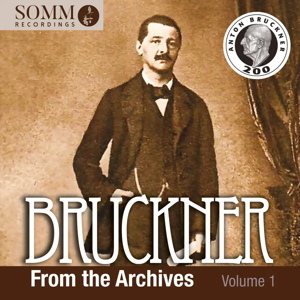
Anton Bruckner (1824-1896)
From the Archives: Volume 1
rec. 1944-1974, AAD
German text & English translation included
SOMM Ariadne 5025-2 [2 CDs: 147]
At first, I couldn’t fathom the rationale for this series. It’s not “the unknown Bruckner”: I’d not heard of the short pieces or the Psalm, but the two symphonies are hardly obscure, and the F minor Symphony, a 1974 aircheck, isn’t a “historical” performance. (That’s in the discographic sense: no doubt, millennials think of 1974 as I thought of World War II.) The studio recording of Psalm 112 indicates it’s not limited to broadcasts, and, with the String Quartet, it isn’t a purely symphonic series. Correspondence with the powers-that-be eventually clarified the matter: these various performances are exhumations from a collector’s heretofore smostly hidden trove — quite literally “Bruckner from the archives.” The intention is eventually to issue a comprehensive, more-or-less chronological anthology.
Unfortunately, the desire for comprehensiveness gets this album off to a rocky start. Kurt Wöss has the right basic idea in the F minor Symphony. It’s at its best in the sweet, flowing start of the Andante molto and the forthright final Allegro, both of which expand in ways that foreshadow Bruckner’s later techniques. Otherwise, this blandish reading doesn’t match the power of Elyakum Shapirra’s analog EMI LP. The Linz orchestra doesn’t have the needed tonal weight, and Wöss occasionally lacks the necessary rhythmic control. In the first movement, the string syncopations that should nudge the second theme forward turn thick and oozy, to precisely the opposite effect; the ritard at the Scherzo’s end is similarly soggy. Scansion is unclear in the finale’s second group.
The small pieces under Hans Weisbach are interesting, though perhaps less important. The start of the March hints at Expressionism, and its second Trio — it’s in expanded tripartite form — is serenely affirmative. The first of the Three Pieces begins, unconventionally, in the midrange horns; the second is unsettled and mysterious; the third, starting from a broad tutti, turns Mendelssohnian!
The blocklike contours and rhythms of Psalm 119, for double chorus and orchestra, resemble those of the well-known Te Deum. Like the F minor Symphony, this is a student work, and the composer didn’t formally complete it, indicating that the opening section should once again be repeated, which at least rounds off the structure. Henry Swoboda guides the piece firmly. I occasionally thought I was hearing a soloist or two, but no solo parts are indicated: I suspect the double-chorus divisions may have taxed the Akademie Kammerchor, whose massed sonority is otherwise thick, but clean and well tuned.
The G minor Overture comes and goes in the catalogue, it’s a strong early-Romantic piece, though I can never decide whether Bruckner’s characteristic sequential harmonies propel the development or stall it. The aforementioned Shapirra LP offers it in colourful stereo, but here the archive tops it: Dean Dixon shapes a taut, turbulent performance, and the WDR Symphony responds alertly, with clear textures. (It represents Dixon far better than that Tchaikovsky Pathétique that kicked around on Everest LPs for years.)
Eugen Jochum recorded two full Bruckner symphony cycles in stereo, but this First, from a 1959 broadcast, outshines both remakes in its forthright approach. The opening marziale theme, which steps smartly, feels unusually brisk, but Jochum’s, unlike several more recent accounts, maintains firm vertical weight along with the horizontal propulsion. The fanfares at the end of the first movement feel almost precipitate; the Adagio ebbs and flows more than most. The immediate attacca launch of the Scherzo is effective, though it’s unclear whether the decision was the conductor’s or the engineers’. The emphatic Finale, alas, is rather a din, though the syncopations are right as Wöss’s weren’t, and Jochum shapes a good, strong landing on the modified return.
The earliest work here is the String Quartet, yet another student work. Annotators are prone to hear hints of the later Bruckner in it, which puzzles me: if the F minor Symphony is “Mendelssohn on steroids,” as I’ve said elsewhere here, the Quartet simply loses the steroids. It’s lovely in its simplicity, occasionally quite fetching. The Koeckerts’ 1951 broadcast is convincing, though the Scherzo‘s scansion takes a few bars to fall into place.
Lani Spahr’s dedicated remasterings are particularly vivid on Disc 2, everything on which sounds better than the rather “blah” F minor. Benjamin Korstvedt’s program note is thorough and informative, though, at one point, he uses the phrase “musicians and singers,” which may offend some of the latter.
Stephen Francis Vasta
stevedisque.wordpress.com/blog
Buying this recording via a link below generates revenue for MWI, which helps the site remain free



Previous review: John Quinn (May 2024)
Contents
CD1
Symphony in F Minor, WAB 99 (1863)*
Bruckner Orchestra, Linz / Kurt Wöss
rec. live 11 June 1974
March in D Minor, WAB 96 (1862)**
Three Pieces for Orchestra, WAB 97 (1862)**
Vienna Symphony Orchestra / Hans Weisbach
rec. 9 May 1944
Psalm 112, WAB 35 (1863)
Vienna Akademie Kammerchor
Vienna Symphony Orchestra / Henry Swoboda
rec. 1950
CD2
Overture in G Minor, WAB 98 (Revised 1863)*
WDR Symphony Orchestra, Köln / Dean Dixon
rec. 1959
Symphony No. 1 in C Minor, WAB 101 (1866) (Linz version, ed. Nowak)*
Bavarian Radio Symphony Orchestra / Eugen Jochum
rec. live 1 January 1959
String Quartet in C minor, WAB 111 (1862)*
Koeckert Quartet
rec. live 9 March 1951
*First release
** First CD release

















